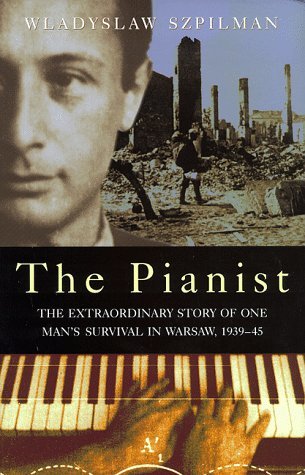Missy J's Reviews > The Pianist: The Extraordinary Story of One Man's Survival in Warsaw, 1939–45
The Pianist: The Extraordinary Story of One Man's Survival in Warsaw, 1939–45
by


Monument of the Umschlagplatz in Warsaw today.
I don't know how to write a review for such a horrifying account of what Wladyslaw Szpilman experienced as a Jew in Warsaw during the Holocaust. His writing is very dispassionate and precise, yet he really brought forth the horrors of the war and his daily life struggles; losing his family, hunger, stress, uncertainty and fear. I was also very much inspired by how strong his instincts were in certain situations. It's incredible how during times of stress, our body can communicate with us so strongly in favor of survival. Often times, I had to stop and reflect how humans are able to do these cruel acts to each other. How could the soldiers follow and carry out those cold-hearted orders without any emotions or rationale? What makes the Holocaust especially gruesome is the systematic "war-machine" approach to exterminate certain peoples. Even though I've read my share of Holocaust-accounts, I still get shivers thinking that everything described in the book actually took place in real life. Very thought-provoking and important. Thank you Mr. Wladyslaw Szpilman for recording this down.
by

Missy J's review
bookshelves: 2016-books, biography, non-fiction, world-war-ii, europe-related, male-author
Mar 02, 2016
bookshelves: 2016-books, biography, non-fiction, world-war-ii, europe-related, male-author

Monument of the Umschlagplatz in Warsaw today.
I don't know how to write a review for such a horrifying account of what Wladyslaw Szpilman experienced as a Jew in Warsaw during the Holocaust. His writing is very dispassionate and precise, yet he really brought forth the horrors of the war and his daily life struggles; losing his family, hunger, stress, uncertainty and fear. I was also very much inspired by how strong his instincts were in certain situations. It's incredible how during times of stress, our body can communicate with us so strongly in favor of survival. Often times, I had to stop and reflect how humans are able to do these cruel acts to each other. How could the soldiers follow and carry out those cold-hearted orders without any emotions or rationale? What makes the Holocaust especially gruesome is the systematic "war-machine" approach to exterminate certain peoples. Even though I've read my share of Holocaust-accounts, I still get shivers thinking that everything described in the book actually took place in real life. Very thought-provoking and important. Thank you Mr. Wladyslaw Szpilman for recording this down.
Sign into Goodreads to see if any of your friends have read
The Pianist.
Sign In »
Reading Progress
March 2, 2016
–
Started Reading
March 2, 2016
– Shelved
March 2, 2016
– Shelved as:
2016-books
March 4, 2016
–
48.0%
"Heart-breaking :(
The author was about to board a truck with his family for the gas chambers, when he was swiftly picked out from the crowd by a SS soldier, because he is a pianist.
Extremely sad, especially because this is a real account."
The author was about to board a truck with his family for the gas chambers, when he was swiftly picked out from the crowd by a SS soldier, because he is a pianist.
Extremely sad, especially because this is a real account."
March 5, 2016
–
Finished Reading
August 6, 2016
– Shelved as:
biography
August 6, 2016
– Shelved as:
non-fiction
August 6, 2016
– Shelved as:
world-war-ii
August 6, 2016
– Shelved as:
europe-related
March 4, 2022
– Shelved as:
male-author
Comments Showing 1-2 of 2 (2 new)
date newest »
newest »
 newest »
newest »
message 1:
by
Noreen
(new)
Mar 05, 2016 12:45PM
 Was "The Pianist" the basis for the Oscar movie staring Adrian Brody?
Was "The Pianist" the basis for the Oscar movie staring Adrian Brody?
reply
|
flag
 Yes, Noreen, the movie staring Adrian Brody is based on this book.
Yes, Noreen, the movie staring Adrian Brody is based on this book. Some differences I noted between the book and the movie: there's a love interest in the movie, which doesn't happen in the book. Also, the end of the book includes diary entries of Captain Hosenfeld (the German officer, who helped bring Wladyslaw food and a coat), who is a devout Catholic and disgusted by the daily atrocities committed by fellow Germans.


